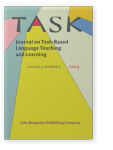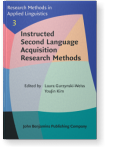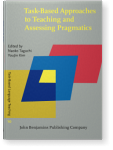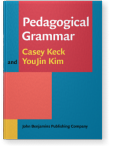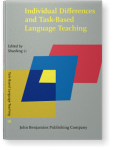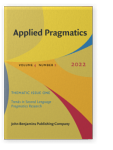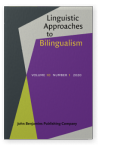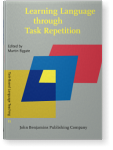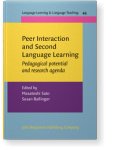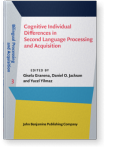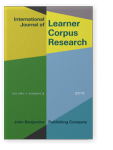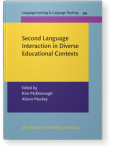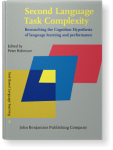YouJin Kim
List of John Benjamins publications for which YouJin Kim plays a role.
Journal
Titles
Instructed Second Language Acquisition Research Methods
Edited by Laura Gurzynski-Weiss and YouJin Kim
[Research Methods in Applied Linguistics, 3] 2022. xxiv, 388 pp.
Subjects Applied linguistics | Language acquisition | Language teaching
Task-Based Approaches to Teaching and Assessing Pragmatics
Edited by Naoko Taguchi and YouJin Kim
[Task-Based Language Teaching, 10] 2018. x, 312 pp.
Subjects Language acquisition | Language teaching | Pragmatics
Subjects Applied linguistics | Language acquisition | Language teaching
2024 A journey of sustainable TBLT curricular development: Collaborating with various stakeholders and producing TBLT ambassadors TASK 4:2, pp. 267–289 | Article
Task-based Language Teaching (TBLT), introduced in the early 1980s, has significantly matured through the integration of theories and research from instructed second language acquisition (ISLA) and educational practice, effectively addressing the growing need for efficient programs. Although… read more
2024 Chapter 7. A review of learner motivation and engagement research in task-based language teaching Individual Differences and Task-Based Language Teaching, Li, Shaofeng (ed.), pp. 198–227 | Chapter
This chapter presents a systematic review of 54 studies on learner motivation and engagement in the research domain of TBLT. The review focuses on various learner (e.g., first language), contextual (e.g., institution), and task (e.g., task modality) characteristics in previous research. The… read more
2022 Chapter 6. Unique considerations for ISLA research across approaches Instructed Second Language Acquisition Research Methods, Gurzynski-Weiss, Laura and YouJin Kim (eds.), pp. 125–146 | Chapter
In this chapter, which comprises Section III, we discuss several of the most important and impactful considerations that can affect ISLA research design, implementation, and interpretation across methodological approaches. We unpack the use of intact classes, small sample sizes, and recruiting… read more
2022 Chapter 1. Getting started: Key considerations Instructed Second Language Acquisition Research Methods, Gurzynski-Weiss, Laura and YouJin Kim (eds.), pp. 3–28 | Chapter
This introductory chapter orients the reader to both instructed second language acquisition (ISLA) and research methods in general. We begin with an operationalization of ISLA, followed by an outline of the main research questions and overarching goals within ISLA, and specification of the… read more
2022 The interface between instructed L2 pragmatics and TBLT research: A review of instructional materials Trends in Second Language Pragmatics Research Part I: , pp. 159–177 | Article
Over the past two decades, the theoretical backgrounds of instructed second language (L2) pragmatics studies have diversified, and instructional materials have been designed and implemented based on various theories of second language acquisition (SLA). As a result, the field of instructed… read more
2022 Chapter 15. Contributing to the advancement of the field: Collaboration and dissemination in ISLA Instructed Second Language Acquisition Research Methods, Gurzynski-Weiss, Laura and YouJin Kim (eds.), pp. 355–378 | Chapter
In this final chapter, we share suggestions for developing ISLA research that informs pedagogy and vice-versa, particularly focusing on the importance of training ISLA researchers, promoting collaboration among various stakeholders, and disseminating ISLA research to a larger audience. First, we… read more
2020 The action dynamics of native and non-native speakers of English in processing active and passive sentences Linguistic Approaches to Bilingualism 10:1, pp. 58–85 | Article
This study investigates processing of passive and active constructions between native speakers (NS) and non-native speakers (NNS) of English using traditional on-line mechanisms such as response time in conjunction with techniques that capitalize on the parallel activation of distributed mental… read more
2018 Chapter 2. Learning of Korean honorifics through collaborative tasks: Comparing heritage and foreign language learners Task-Based Approaches to Teaching and Assessing Pragmatics, Taguchi, Naoko and YouJin Kim (eds.), pp. 27–54 | Chapter
This study examines the effects of collaborative writing tasks on the development of Korean honorifics among heritage language (HL) and foreign language (FL) learners. Participants were 14 HL learners (HLLs) and 32 FL learners (FLLs) of Korean (i.e., 14 HLL-FLL and 9 FLL-FLL dyads) in… read more
2018 Chapter 3. The effects of task repetition and task complexity on L2 lexicon use Learning Language through Task Repetition, Bygate, Martin (ed.), pp. 75–96 | Chapter
To date, a growing number of studies in instructed second language acquisition (SLA) have investigated the effects of task repetition on L2 performance (e.g., complexity, accuracy, fluency) as well as on the occurrence of interaction-driven learning opportunities (e.g., Bygate, 2001; Fukuta, 2016;… read more
2018 Chapter 1. Task-based approaches to teaching and assessing pragmatics: An overview Task-Based Approaches to Teaching and Assessing Pragmatics, Taguchi, Naoko and YouJin Kim (eds.), pp. 1–24 | Chapter
2016 8. Engagement with the language: How examining learners’ affective and social engagement explains successful learner-generated attention to form Peer Interaction and Second Language Learning: Pedagogical potential and research agenda, Sato, Masatoshi and Susan Ballinger (eds.), pp. 209–239 | Article
Interactive tasks that have successfully promoted attention to form and language learning in face-to-face (FTF) can be ineffective when performed online (Baralt 2013, 2014). This research is concerning, given the push for online language classes in higher education (Leow, Cerezo, & Baralt 2015).… read more
2016 Working memory and L2 English speakers’ primed and subsequent production of passives Cognitive Individual Differences in Second Language Processing and Acquisition, Granena, Gisela, Daniel O. Jackson and Yucel Yilmaz (eds.), pp. 205–222 | Chapter
Although first language researchers have investigated the relationship between individual differences and structural priming (Kaschak, Kutta, & Jones 2011; Kidd 2012a, b), fewer studies have explored this relationship in second language (L2) speech production (McDonough, Kielstra, Crowther, &… read more
2015 Native language identification and writing proficiency International Journal of Learner Corpus Research 1:2, pp. 187–209 | Article
This study evaluates the impact of writing proficiency on native language identification (NLI), a topic that has important implications for the generalizability of NLI models and detection-based arguments for cross-linguistic influence (Jarvis 2010, 2012; CLI). The study uses multinomial logistic… read more
2013 1. Promoting attention to form through task repetition in a Korean EFL context Second Language Interaction in Diverse Educational Contexts, McDonough, Kim and Alison Mackey (eds.), pp. 3–24 | Chapter
This chapter compares the impact of task repetition and procedural repetition on Korean EFL learners’ (n = 48) attention to linguistic form during collaborative tasks. Two EFL classes were randomly assigned to carry out three collaborative tasks with either task repetition or procedural repetition.… read more
2011 Chapter 11. Task complexity, language anxiety, and the development of the simple past Second Language Task Complexity: Researching the Cognition Hypothesis of language learning and performance, Robinson, Peter (ed.), pp. 287–306 | Chapter
A main prediction of the Cognition Hypothesis is that individual differences will influence learners’ perceptions of task difficulty and, as a result, affect performance and learning as task complexity is increased. To date, little research has investigated this claim, leaving open the question… read more
